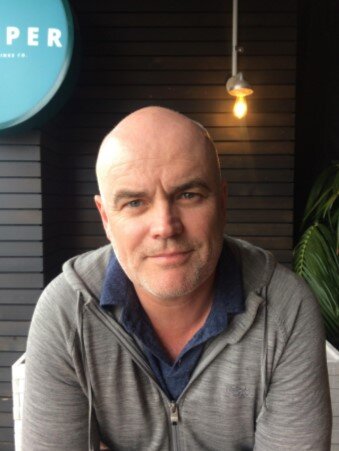By Natalie Gomez
The Oxford English Dictionary defines dystopia as “an imaginary place or condition in which everything is as bad as possible.” For many who are suffering through hardships brought on by the outbreak of COVID-19, this condition is not imaginary but their reality.
UCSB English lecturer Brian Donnelly is teaching a dystopian fiction course this spring that investigates themes that uniquely pertain to the condition students find themselves in the wake of COVID-19. Photo by Heather Blurton.
UC Santa Barbara English lecturer Brian Donnelly found himself in the difficult position of teaching a course on dystopian fiction this spring, a time when students might see their lives reflected in the texts more than normal. Some of the dystopian works featured in the course are Suzanne Collins’ popular Young Adult political novel “The Hunger Games,” singer Janelle Monáe’s Afrofuturism concept albums “Metropolis Saga,” and South African director Neill Blomkamp’s alien-encounter action film “District 9.”
Instead of perpetuating feelings of unease, the course has fostered an online space where students have been in active dialogue with one another, Donnelly says. Students have shared their own poetry and visual art in response to the dystopian material and are collaboratively compiling a playlist called “Songs for Social Spacing.”
In a recent interview, Donnelly discussed his initial apprehension about teaching a course with a dark theme during a pandemic. He talked about the positive reactions the course has received from students and what he hopes students will take away from the course.
Q: When and how did the idea for “Sci-Fi: Dystopian” originally develop?
A: It started as a class called “Imaginary Futures,” which was a speculative fiction class that developed because I was working on some research based on early science fiction from the late Victorian period. Then, I started working on some later dystopian sci-fi works, like Cormac McCarthy’s “The Road,” for an article, and I thought, “I could teach a class on this material.”
At the same time, I began teaching our really large “Intro to Science Fiction” genre class at UCSB, that’s kind of like a history of sci-fi from someone like H. G. Wells through to the present. And so, I decided to combine the two.
“Sci-Fi: Dystopian” student Quill Sang produced a digitally modified watercolor and pen piece inspired by E.M. Forster's 1909 “The Machine Stops,” a short story in which humans live in isolation and only communicate through a machine. Provided by Sang.
Q: Under our current circumstances of self-quarantine and remote learning, how has the course had to evolve?
A: Well, it was a little scary because at first I wasn’t sure that the material wouldn’t be quite traumatic. The material we read has so much to do with contemporary dystopian moments, and it seemed like we were slipping into one. In particular, when we read “Station Eleven” [by Emily St. John Mandel] at the end of the quarter — that is a novel that begins with a pandemic flu. So, first I thought, “Well I’m not sure if I should change some material.” But, in discussion with the teaching assistants, we decided to stick to what we had planned.
Then, we had to think about the format of the class and how we could best foster student engagement and not increase feelings of isolation. We decided, each week, to have discussion forums and check-in polls to keep people coming back to the class.
Q: In what ways have you noticed students in the course forming an online community?
A: I’ve been really blown away actually. I was quite surprised by the amount of interaction and discussion that we’ve seen through our [electronic platform] Nectir channel responses. At first, I think people were a little bit wary of getting into a discussion with someone online. But now, given the material’s relevance to the current moment, people are interested in it. The fact that people are feeling starved of conversation, that their networks are limited to in person conversation, they are becoming more invested in those online conversations.
Q: What do you hope students can gain from this course, especially in relation to the fear and anxiety they might be feeling in response to a rapidly changing world?
In response to the 2014 sci-fi thriller “Ex Machina,” Jake Miller wrote a short piece of music titled “Human?” that explores the evolution of artificial intelligence and the uncanny valley effect that occurs once machines become indistinguishable from humans.
A: I think, as with the study of all literature from all periods, that the cultural representations — the things that we make artistically — are the most enduring legacy that we have as human beings. So, for me, the ability to read this material and watch these movies during this time allows us to frame our experience. Even if it seems like outlandish science fiction, it still gives us a sense of how we approach different crises or moments.
In terms of the specific class, dystopian fiction is a way for us to imagine different kinds of futures. I think that's important because it allows us to engage creatively with this traumatic period in our lives and to see productively through it to something less dark and foreboding. “Station Eleven,” after all, is a novel about the value of performing Shakespeare in a post-pandemic world, and that’s an idea we can all get behind.
Natalie Gomez is a second-year English major at UC Santa Barbara. She wrote this article for her Writing Program course, Journalism for the Web and Social Media.




